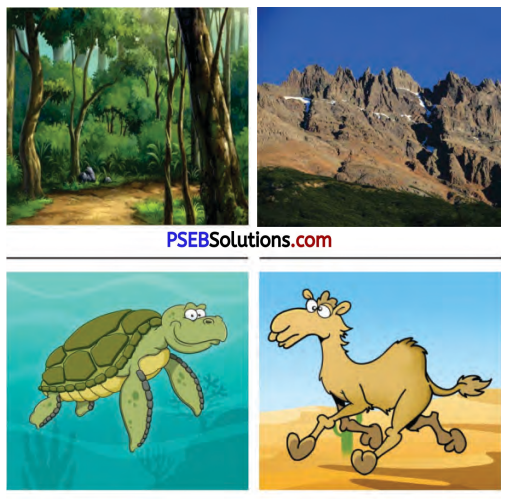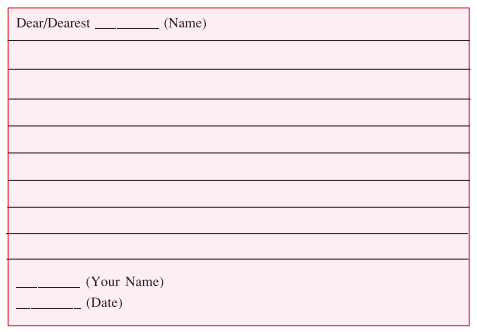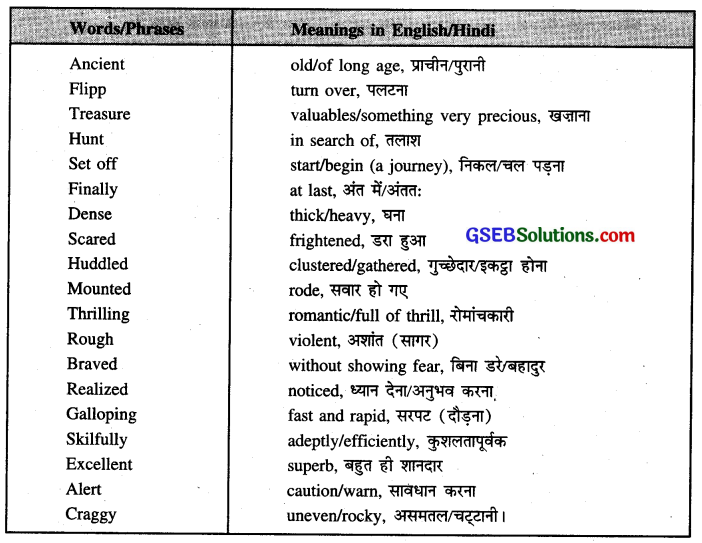Punjab State Board PSEB 7th Class English Book Solutions Chapter 6 A Treasure Hunt Textbook Exercise Questions and Answers.
Class 7th English Solutions Chapter 6 A Treasure Hunt Question Answers
A Treasure Hunt Class 7 Questions and Answers
Activity 1
Look up the following words/phrases in a dictionary. You should seek the following information about the words and put them in your WORDS notebook.
1. Meaning of the word as used in the story (adjective/noun/verb, etc.)
2. Pronunciation (The teacher may refer to the dictionary or the mobile phone for correct pronunciation.)
3. Spellings
| ancient | treasure | swept across | huddled | skilfully |
| mounted | set off | thrilling | braved | realized |
![]()
Vocabulary Expansion
Activity 2
Question 1.
Choose suitable phrases from the box to write below each image a dense forest
| a dense forest | a galloping camel |
| craggy mountains | a swimming turtle |

Answer:
a dense forest
a craggy mountain
a galloping camel
a swimming turtle
Learning to Read and Comprehend
Activity 3
What is meant by the bold words in the following sentences? The first one has been done for you.
Question 1.
The eagle agreed and joined the two.
Answer:
The word ‘two’ refers to the lion and Sagar.
Question 2.
The eagle watched every step they took with his sharp eyes.
Answer:
The word ‘they’ refers to Sagar and the lion.
Question 3.
There, they met a sheep.
Answer:
The word ‘they’ refers to Sagar, the lion and the eagle.
![]()
Question 4.
Will you join us in a treasure hunt and keep us warm when it’s cold ?
Answer:
The word ‘you’ refers to the sheep.
Question 5.
You are called the ship of the desert.
Answer:
The word ‘You’ refers to the camel.
Question 6.
The four finally reached the desert.
Answer:
The word ‘four’ refers to Sagar, the lion, the eagle and the sheep.
Question 7.
The rough waves almost drowned them.
Answer:
The word ‘them’ refers to Sagar, the lion, the eagle, the sheep and the camel.
Question 8.
Indeed, they had found the greatest treasure ever!
Answer:
The word “they’ refers to Sagar, the lion, the eagle, the sheep, the camel and the turtle.
Activity 4
Answer the following questions.
Question 1.
What did Sagar find in the library ?
सागर को लाइब्रेरी में क्या मिला ?
Answer:
Sagar found an ancient book in the library.
Question 2.
What did he plan to do ?
उसने क्या करने की योजना बनाई ?
Answer:
He planned to go in search of the treasure.
![]()
Question 3.
Where did Sagar go first? Whom did he meet there?
सागर सबसे पहले कहां गया ? वहां वह किससे मिला ?
Answer:
Sagar went to a forest first. He met a lion there.
Question 4.
Why did Sagar feel scared in the forest ?
वन में सागर डर क्यों गया था ?
Answer:
Sagar felt scared because the forest was dense and dark.
Question 5.
Where did Sagar and the lion go from the forest ?
सागर तथा शेर वन से कहां गए ?
Answer:
They went to a mountain from the forest.
Question 6.
What did Sagar ask the eagle to do ? Why ?
सागर ने गिद्ध से क्या करने को कहा ? क्यों ?
Answer:
Sagar asked the eagle to alert them against the danger because the eagle had very good eyesight.
Question 7.
Who did they meet in the valley ?
घाटी में वे किससे मिले ?
Answer:
In the valley, they met a sheep.
Question 8.
How would the sheep help Sagar and others ?
भेड़ सागर तथा उसके अन्य साथियों की सहायता कैसे कर सकती थी ?
Answer:
The sheep would keep them warm in cold.
Question 9.
How did the camel help them ?
ऊँट ने उनकी सहायता कैसे की ?
Answer:
The camel helped them cross the vast desert.
![]()
Question 10.
What did the turtle do to help them ?
कछुए ने उनकी सहायता करने के लिए क्या किया ?
Answer:
The turtle took them across the ocean.
Activity 5
Discuss the following in groups and explain it in the given space. . “Congratulations ! You have found the treasure !” What did the owl want to tell Sagar and his companions ?
ऊपर दिया गया वाक्य कह कर उल्लू सागर तथा उसके साथियों को क्या बताना चाहता था ?
Answer:
The owl wanted to tell them that friendship is a great blessing. It is the greatest treasure ever. They were lucky to find it.
Learning Language
Parts of Speech
Till now, we have done nouns, pronouns, verbs, adjectives, adverbs, prepositions etc. They are called Parts of Speech.
Activity 6
Read each sentence below and look carefully at the underlined words.
If the word names a person, place, thing or idea, it is a NOUN. Write N in the given space.
If the word shows an action, it is a VERB. Write V in the given space.
If the word describes a noun, it is an ADJECTIVE. Write A in the given space.
Answer:
1. Maria picked a fresh rose from the garden for her aunt. — N
2. Does anyone have a rose garden? — A
3. The puppy rose and patted his mother for attention. — V
4. He will book a hotel room for you. — V
5. I bought a new book. — N
6. Do you know of a book club ? — A
7. Corner the mouse if you want to catch it. — V
8. Corners of my book were torn. — N
9. I live in the corner house. — A
10. Some paper yellow with age. — V
11. Diana needs yellow paint to make the painting. — A
12. Yellow is a nice colour. — N
13. I like baby pink colour. — A
14. The baby kept crying. — N
15. My grandmother likes to baby me. — V
![]()
Learning to Listen Dictation
Activity 7
Your teacher will speak some words from the story. Listen carefully and write their spellings.
Answer:
1. ancient
2. treasure
3. swept
4. huddled
5. mounted
6. thrilling
7. braved
8. realized
9. ocean
10. galloped.
नोट :-विद्यार्थी इन शब्दों की spellings याद करें और ये शब्द लिखने का अभ्यास करें।
Activity 8
Read the following poem with proper pronunciation. Put more STRESS on the bold words in each line. Remember poems are to be read and not sung like nursery rhymes.
(The teacher must help the students.)
Sympathy
I lay in sorrow, deep distressed
My grief a proud man heard
His looks were cold.
He gave me gold.
But not a kindly word.
My sorrow passed – I paid him back
The gold he gave to me.
Then stood erect and spoke my thanks
And blessed his charity.
I lay in want, in grief and pain.
A poor man passed my way.
He bound my head.
He gave me bread.
He watched me night and day.
How shall I pay him back again
For all, he did to me ?
Oh ! Gold is great. But greater far
Is heavenly sympathy ! -Charles Mackay
नोट :-अध्यापक की सहायता से स्वयं करें।
![]()
Learning to Write
Activity 9
Read the following messages that people write for their friends and family on their birthdays.
1. May your special day be filled with love, laughter and happiness. You deserve it.
2. Choose to celebrate your birthday, the way you like. May your birthday bring you the happiness and the good health you deserve.
3. Wishing you happiness and success in your lifelin the coming years.
4. It is always good to remember you, my friend, especially on your birthday. Enjoy! Make it unforgettable!
5. I am so sorry that I forgot your birthday. Belated Happy Birthday.
6. I can’t believe, I missed your birthday. I am so sorry. Wishing you a very happy birthday and success in everything you do.
Activity 10
You forgot to wish your friend on his or her birthday. Write a birthday message for your friend in the card given below.

You must :
1. say sorry to your friend for forgetting to wish him/her
2. give belated wishes to your friend in the message
3. wish your friend happiness, success in life and good health
Some useful words/phrases
1. apologise
2. forget
3. wish
4. deserve
5. celebrate
6. belated
7. many happy returns
8. happiness
9. sincerely
10. success/successful
11. future
12. good health
![]()

You may begin your message with :
| Dear/Dearest Anshu/Anshika How forgetful I am to forget your birthday on May 22, 2020, So I failed to wish you. I am very sorry for this. However, nothing has gone wrong yet. I can still give you my heartly wishes, belated this may be. I always wish for your happiness and success in life. Enjoy good health always. I promise never to forget your birthday in future. Anshika 24 May, 2020 |
Learning to Use Language
Writing a story
Activity 11.
Write a short story (100 words) using the following words. An outline is given below.
Your story must have :
a beginning
a middle/ the main story
a conclusion
Outline
the sun and the wind–friends–one day-an argument—who is stronger-decided to test their strength—saw a man walking—the challenge—to remove the coat-using the strength wind used its strength blew hard-man caught hold of his coat-the wind grew tired—could not remove the coat—the sun’s turn-started shining very brightly-used its heat—man felt hot-removed his coat–the sun became the winner.
Answer:
Once a dispute arose between the sun and the wind. The wind boasted that it was stronger than the sun. But it refused to accept the wind’s superiority. Just then they saw a passerby. He was wearing a coat. Both claimed that they would make the traveller remove his coat. First, it was the wind’s turn to try. It blew as hard as it could. The faster it blew, the tighter the man wrapped up his coat. The wind failed to make the man take off his coat.
![]()
Then it was the sun’s turn to show its strength. It started shining brightly. The man who was shivering with cold, felt relieved. Soon he started sweating all over and removed his coat. Thus the sun won the contest. The wind accpeted its defeat.
Moral : Gentleness is better than pride.
Or
Pride hath a fall.
Comprehension Of Passages:
Read the following passages carefully and answer the questions that follow each :
(1) One day, Sagar went to a library. There, he found an ancient book. He flipped through the pages of the book. In the book, he saw a big sheet folded neatly. He opened the sheet and saw that it was a treasure map. “Hurray! I’m going to find this treasure and have some fun”, he said to himself. Sagar set off for the treasure hunt.
He walked and walked and finally reached a forest. In the forest, he met a lion. “You are strong and brave! I am going on a treasure hunt. Will you come with me ?” said Sagar to the lion. The lion agreed to go with him. They both went into the forest. The forest was dense and dark. Sagar was scared, but they crossed the forest easily because the lion was by his side.
1. What did Sagar see in the book ? What was it ?
सागर ने किताब में क्या देखा ? यह क्या था ?
2. Where did Sagar meet the lion ? How did he praise him ?
सागर को शेर कहां मिला ? उसने शेर की प्रशंसा कैसे की ?
3. Choose true and false statements and write them in your note book.
(a) Sagar found a new book in the library.
(b) Sagar became happy to see a treasure map.
4. Complete the sentences according to the meaning of the passage.
(a) The lion agreed to ……………
(b) Sagar crossed the forest easily because ……
![]()
5. Match the words with their meanings :
| (a) hunt | hurry |
| (b) scared | search |
| afraid |
Answers
1. Sagar saw a big sheet folded neatly. It was a treasure map.
2. Sagar met the lion in the forest. He praised him by saying that he was strong and brave.
3.
(a) False
(b) True
4.
(a) The lion agreed to go with them.
(b) Sagar crossed the forest easily because the lion was by his side.
5.
(a) hunt — search
(b) scared — afraid
(2) Then the two of them reached a mountain. There, they met an eagle. “You have excellent eyesight and you can alert us to dangers! We are looking for treasure. Will you come with us?” said Sagar to the eagle. The eagle agreed and joined the two.
The mountains were tall and craggy. The lion slipped on the mountain but Sagar quickly caught him and gave him a hand. The lion thanked Sagar when he pulled him up. The eagle watched every step they took with his sharp eyes. Soon, they reached a valley.
There, they met a sheep. “Will you join us in a treasure hunt and keep us warm when it’s cold?” Sagar asked the sheep. The sheep agreed and joined the lion, the eagle and Sagar. A cold wind swept across the valley. They all huddled against the sheep who kept them warm and cosy.
1. What could the eagle do for Sagar and his companions ? How ?
गिद्ध सागर तथा उसके साथियों के लिए क्या कर सकता था ? कैसे ?
2. Who could keep them warm in cold ?
ठंड में उन्हें कौन गर्मी दे सकता या
3. Choose true and false statements and write them in your note-book.
(a) The mountains were tall and craggy.
(b) The lion had sharp eyes.
4. Complete the sentences according to the meaning of the passage.
(a) The eagle watched their every step with ……
(b) ……………. swept across the valley.
![]()
5. Match the words with their meanings.
| (a) swept | crowded |
| (b) huddled | blew |
| walked |
Answer:
1. The eagle could alert them to dangers with his sharp eyes.
2. The sheep could keep them warm in cold.
3.
(a) True
(b) False
4.
(a) The eagle watched their every step with his sharp eyes.
(b) A cold wind swept across the valley.
5.
(a) swept — blew
(b) huddled — crowded.
(3) The five finally reached the ocean where they met a turtle. “Can you help us to cross the ocean? We are on a treasure hunt!” said Sagar to the turtle. The turtle agreed and joined the lion, the eagle, the sheep, the camel and Sagar. The rough waves almost drowned them but the turtle swam skilfully and took them across the ocean.
The six of them met an owl on the other side. The old owl spoke from his ancient wisdom, “Congratulations! You have found the treasure!” “Where is it?” they all asked in surprise. “Together, you have crossed the forest, climbed the mountains, braved the desert and swum across the ocean.
You could never have done it without the help of one another!” said the owl. They all looked at one another and realized that the owl was right. They had found friendship! Indeed, they had found the greatest treasure ever !
![]()
1. What was going to drown them ? Who came to their help?
उन्हें क्या चीज़ डुबोने लगी थी ? उनकी सहायता के लिए कौन आगे आया ?
2. Who told them about the real treasure ? What was it ?
उन्हें सच्चे खजाने के बारे में किसने बताया ? यह क्या था ?
3. Choose true and false statements and write them in your note-book.
(a) They had crossed the forest and the ocean together.
(b) They were six before they met a turtle.
4. Complete the sentences according to the meaning of the passage.
(a) They realized that the …………..
(b) They had found the ……………
5. Match the words with their meanings.
| (a) skilfully | adeptly |
| (b) finally | in the beginning |
| in the end |
Answer:
1. The rough waves were going to drown them. The turtle came to their help.
2. The owl told them about the real treasure. It was ‘friendship’.
3.
(a) True
(b) False
4.
(a) They realized that the owl was right.
(b) They had found the greatest treasure ever!
5.
(a) skilfully – adeptly
(b) finally – in the end.
Use Of Words/Phrases In Sentences
1. Neatly (clearly) —
Please write the letter neatly.
कृपया पत्र साफ़-साफ़ लिखें।
2. Folded (wrapped) —
He thanked me with folded hands.
उसने हाथ जोड़ कर मेरा धन्यवाद किया।
3. Give someone a hand (help) —
He gave me his hand while we were crossing the river.
उसने नदी पार करते समय मेरी सहायता की।
4. Realize (to feel) —
He realized his mistake.
उसने अपनी गलती महसूस की।
5. Galloping (running fast) —
The galloping horses were soon out of sight.
तेज़ दौड़ते घोड़ें जल्दी ही अदृश्य हो गए।
6. Braved (faced bravely) —
He braved the danger.
उसने खतरे का वीरतापूर्वक सामना किया।
![]()
7. Set off (start) —
They set off on a long journey.
वे एक लंबी यात्रा पर चल पड़े।
8. Excellent (superb) —
He gave an excellent performance.
उसने बहुत ही शानदार प्रदर्शन किया।
Word Meanings

A Treasure Hunt Summary in Hindi
One day, Sagar ……………..warm and cosy.
एक दिन सागर एक पुस्तकालय गया। वहाँ उसे एक प्राचीन पुस्तक मिली। उसने पुस्तक के पन्नों को पलटा। पुस्तक में उसने एक बड़ा सफ़ाई से मुड़ा हुआ कागज़ देखा। उसने उस कागज़ को खोला और देखा। वह एक ख़जाने का नक्शा (मानचित्र) था। उसने खुशी से चिल्लाते हुए अपने आप से कहा, “मैं खज़ाना ढूंढने जाऊंगा, कुछ मज़ा भी आएगा।” सागर खज़ाने की तलाश में निकल पड़ा। वह चलता गया और अन्ततः एक जंगल में पहुँच गया।
जंगल में वह एक शेर से मिला। सागर ने शेर से कहा, “तुम ताकतवर और बहादुर हो! मैं एक खजाने की तलाश में जा रहा हूँ। क्या तुम मेरे साथ चलोगे।” शेर उसके साथ चलने के लिए सहमत हो गया। दोनों जंगल में गए। जंगल घना तथा अंधेरा था। सागर डर गया, परन्तु उन्होंने आसानी से जंगल पार कर लिया क्योंकि शेर उसके साथ था। तब वे दोनों एक पहाड़ पर पहुँचे। वहां वे एक गिद्ध (Eagle) से मिले। सागर ने गिद्ध से कहा, “तुम्हारी दृष्टि बहुत ही शानदार है और तुम हमें आने वाले खतरों से सावधान कर सकते हो।
![]()
हम खज़ाने की खोज पर हैं। क्या तुम हमारे साथ चलोगे ?” गिद्ध ने अपनी सहमति दी और उनके साथ शामिल हो गया। पहाड़ ऊँचे तथा असमतल थे। शेर पहाड़ पर फिसल गया परन्तु सागर ने शीघ्रता से उसे पकड़ लिया और उसे सहारा दिया। जैसे ही सागर ने शेर को खींचा उसने उसका धन्यवाद किया। गिद्ध उनके प्रत्येक कार्य को अपनी तीव्र दृष्टि से देखता रहा। शीघ्र ही वे एक घाटी में पहुँच गए। वे एक भेड़ से मिले ।
सागर ने भेड़ से पूछा, “क्या तुम खजाने की खोज में हमारे साथ चलोगी और ठंड में हमें गर्मी प्रदान करोगी ?” भेड़ सहमत हो गई और शेर, गिद्ध और सागर के साथ शामिल हो गई। घाटी में ठंडी हवा चल रही थी। वे सभी भेड़ के साथ जुड़ (चिपक) कर बैठ गए जिसने उनके शरीर को गर्मी दी और आराम पहुँचाया।
The four finally ……………. treasure ever !
चारों अन्ततः एक रेगिस्तान पहुँचे जहाँ उन्होंने एक ऊँट को देखा। सागर ने ऊँट से कहा, “तुम्हें रेगिस्तान का जहाज़ कहा जाता है! क्या तुम खज़ाना खोजने में हमारे साथ चलोगे और रेगिस्तान को पार करवाने में हमारी सहायता करोगे ?” ऊँट सहमत (मान) हो गया। शेर, भेड़ और सागर ऊँट पर सवार हो गए और खुशी-खुशी बड़े रेगिस्तान को पार करने के लिए चल पड़े। गिद्ध उनका मार्गदर्शन करता रहा। ऊँट सरपट दौड़ने लगा। ऊँट पर बैठ कर रेगिस्तान को पार करना रोमांचक (अनुभव) था।
पाँचों आखिरकार महासागर पर पहुँच गए जहाँ उन्हें एक कछुआ मिला। सागर ने कछुए से कहा, “क्या तुम महासागर को पार करने में हमारी मदद करोगे ? हम खजाने की खोज पर हैं।” कछुआ मान गया और शेर, गिद्ध, भेड़, ऊँट और सागर के साथ चल पड़ा। अशांत/कष्टदायक लहरों ने उन्हें लगभग डुबो ही दिया था, परन्तु कछुए ने कुशलतापूर्वक तैर कर उन्हें सागर पार करवा दिया।
सभी छ: को दूसरी ओर एक उल्लू मिला। बूढ़ा उल्लू अपनी प्राचीन बुद्धिमत्ता दिखाते हुए बोला, “बधाई हो! तुम्हें खजाना मिल गया।” उन सभी ने हैरानी से पूछा, “कहाँ है वह ?” उल्लू ने कहा, “तुम सबने एक साथ जंगल पार किया, पहाड़ पर चढ़े, बहादुरी से रेगिस्तान और तैरकर यह सागर पार किया है। तुम एक-दूसरे की मदद के बिना यह नहीं कर सकते थे।” उन सबने एक-दूसरे की ओर देखा और अनुभव किया कि उल्लू ठीक कह रहा है। उन्हें ‘मित्रता’ मिल गई थी। वास्तव में उन्हें अब तक का सबसे बड़ा खज़ाना मिल गया था।
![]()
Retranslation Of Isolated Sentences
1. There he found an ancient book. — वहाँ उसे एक प्राचीन पुस्तक मिली।
2. I am going to find this treasure. — मैं इस खज़ाने को ढूंढने जा रहा हूँ।
3. Sagar set off for treasure hunt. — सागर खज़ाने की तलाश में निकल पड़ा।
4. They both went into the forest. — वे दोनों जंगल में गए।
5. You have excellent eyesight. — तुम्हारी दृष्टि बहुत ही अच्छी है।
6. The eagle agreed and joined the two. — गिद्ध सहमत हो गया और दोनों में शामिल हो गया।
7. A cold wind swept across the valley. — घाटी में शीत लहर चल रही थी।
8. You are called the ship of the desert. — तुम्हें रेगिस्तान का जहाज़ कहा जाता है।
9. You have found the treasure. — तुम्हें खज़ाना मिल गया है।
10. You could never have done it without the help of one another. — तुम एक-दूसरे की सहायता के बिना यह काम नहीं कर सकते थे।
11. They all huddled against the sheep. — वे सभी भेड़ के साथ चिपक कर बैठ गए।
12. The forest was dense and dark. — वन सघन और अंधेरा था।
English Guide for Class 7 PSEB Prose
